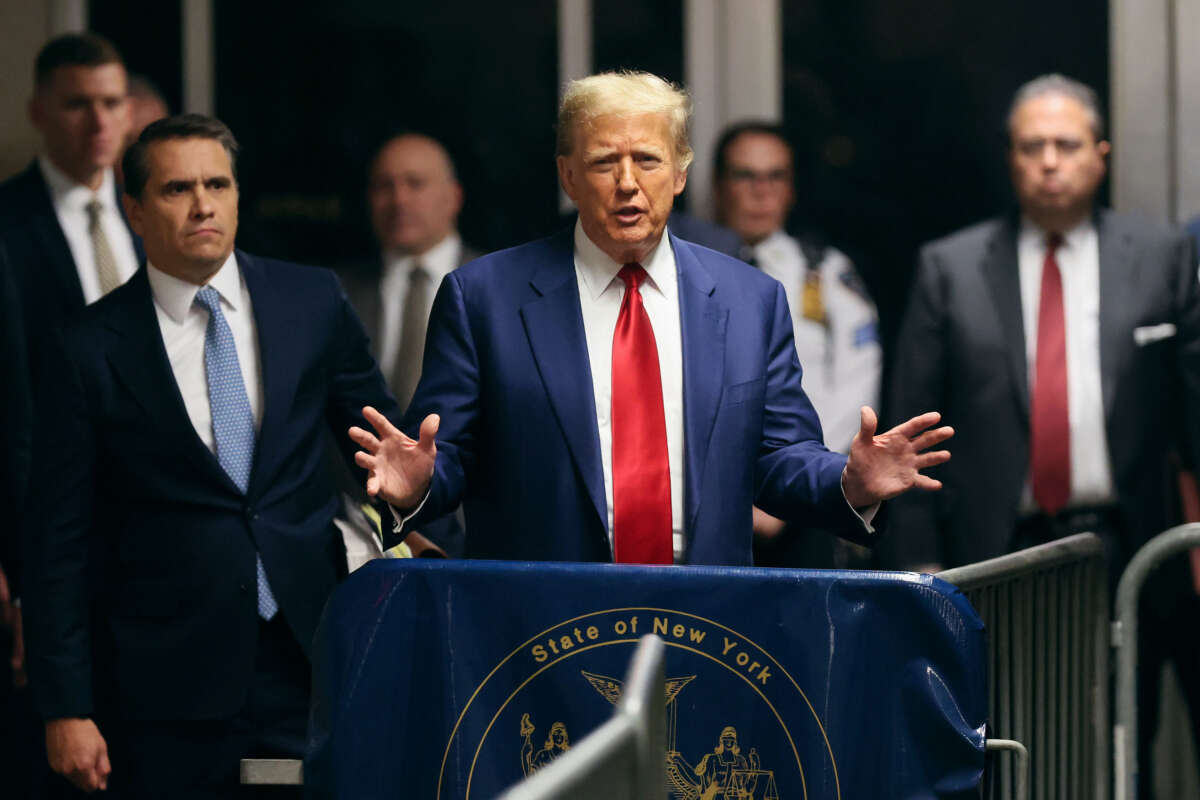A New York state appellate court judge has rejected a request from former President Donald Trump to delay his “hush money” trial that is set to begin next week.
The trial centers on Trump’s attempts to hide payments he made to adult film actress Stormy Daniels. According to the Manhattan District Attorney’s office, Trump made these payments through his former “fixer” lawyer Michael Cohen, who was then reimbursed by the Trump Organization through the falsifying of business records to conceal his extramarital affair with Daniels prior to the 2016 presidential election.
Trump faces 34 counts of falsifying records, with the maximum penalty of four years in prison for each count if he’s found guilty, although prison time isn’t always the outcome of these kinds of cases.
On Monday, a hearing was held before appellate division Justice Lizbeth González, after Trump’s lawyers brought up a motion to delay the trial, claiming that the proceedings had to be moved out of the city of New York because “an impartial jury cannot be selected right now based on prejudicial pretrial publicity.”
González rejected the argument, issuing a ruling with no explicit explanation attached to it.
The rejection doesn’t mean that the demand to move the trial elsewhere won’t be reconsidered, only that the trial will not be delayed on account of such a request. However, given that the trial is set to commence next week, with jury selection to begin right away, it’s unlikely that serious consideration of the demand will be entertained by this or any other appellate court in New York.
During the hearing, the District Attorney’s office pointed out that Trump’s complaints that pre-trial publicity could affect the outcome of the case were improper — indeed, Steven Wu, a lawyer for the DA’s office, noted that Trump was “trying to have it both ways” by simultaneously complaining about publicity while also seemingly relishing in it, as the former president has held numerous press conferences before and after pre-trial hearings, and discusses the trial regularly in online rants and at campaign rallies.
Also on Monday, Trump’s lawyers filed a lawsuit against Judge Juan Merchan, the judge overseeing the hush money case, regarding a gag order that was placed on the GOP candidate for president, limiting how he can discuss potential witnesses in the case and other court officials and their families. Trump has frequently claimed, without evidence, that Merchan is biased against him. The arguments in that lawsuit are under seal, and thus not available to the public.
It’s unlikely that that lawsuit will move forward, as it is an unusual and extraordinary route to sue a judge presiding over a case in order to change an order they’ve made in their courtroom. On Tuesday, a different judge denied the adjoining request to have the lawsuit delay the trial until the matter is settled.
If no other delays come about, the trial will begin on April 15, with jury selection to commence at that time. According to the jury questionnaire, potential jurors will not be asked to divulge if they are supportive of any specific political party, although they will be asked about their feelings regarding multiple political groups.
Jurors will have to provide, for example, their opinions on QAnon, a pro-Trump web of conspiracy theories that allege he’s fighting a secret war against a corrupt cabal of Democratic figures trying to influence society. The jury pool will also have to give their opinions on the Proud Boys, Oath Keepers, Three Percenters and Boogaloo Boys, far right extremist groups that are supportive of Trump.
The questionnaire also includes a question about jurors’ views on antifa, a loosely connected movement of anti-fascist individuals across the country. Trump and his followers have pushed unfounded claims about the antifa movement, including falsely alleging that they prompted the violence at the U.S. Capitol on January 6, 2021, when in fact the attackers were Trump loyalists.
Angry, shocked, overwhelmed? Take action: Support independent media.
We’ve borne witness to a chaotic first few months in Trump’s presidency.
Over the last months, each executive order has delivered shock and bewilderment — a core part of a strategy to make the right-wing turn feel inevitable and overwhelming. But, as organizer Sandra Avalos implored us to remember in Truthout last November, “Together, we are more powerful than Trump.”
Indeed, the Trump administration is pushing through executive orders, but — as we’ve reported at Truthout — many are in legal limbo and face court challenges from unions and civil rights groups. Efforts to quash anti-racist teaching and DEI programs are stalled by education faculty, staff, and students refusing to comply. And communities across the country are coming together to raise the alarm on ICE raids, inform neighbors of their civil rights, and protect each other in moving shows of solidarity.
It will be a long fight ahead. And as nonprofit movement media, Truthout plans to be there documenting and uplifting resistance.
As we undertake this life-sustaining work, we appeal for your support. We have 10 days left in our fundraiser: Please, if you find value in what we do, join our community of sustainers by making a monthly or one-time gift.
